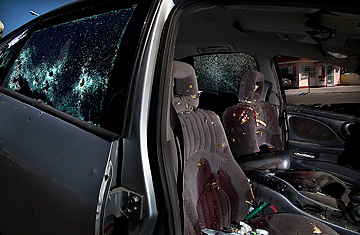
A car shot up in a Juárez gun battle
(3 of 4)
It isn't just the unemployed who get sucked into the war. If you have a pilot's license, for example, you're useful to a cartel, which makes you a target for rival gangs. A few years ago in Culiacán — the capital of northern Sinaloa state, the cradle of Mexican drug trafficking — I arrived at the scene of the murder of pilot Manuel López, 29, just as paramedics loaded his bullet-riddled body into an ambulance. Gunmen had shredded him and his Jeep Sahara in front of his home and relatives — who told me, in tear-stained shock, that they had no idea he was airlifting drugs.
A Slaughter of Innocents
I've seen too many scenes like that. But even the most hardened souls were shaken by the discovery in recent weeks of fosas, or mass graves, in several locations across northern Mexico. So far, close to 500 corpses have been recovered. Many were innocent victims, ordinary Mexicans grabbed at roadblocks erected by gunmen who shake them down and then, in many cases, murder them. Perhaps most depressing of all is the fact that the culprits include policemen: 17 cops were recently arrested in connection with massacres in Tamaulipas. In fact, police in Mexico, who are usually miserably paid and poorly trained, often join up precisely because the force is a recruiting pool for the cartels.
Human-rights advocates say the fosas recall the killing fields of the Balkans in the 1990s or Central America in the 1980s. "I think the world should be as worried about what's happening here as they are about what's happening in North Africa," says Carlos García, president of the human rights commission in the northern desert state of Durango, where seven mass graves have been found, many in middle-class neighborhoods or near schools. When I arrived with forensics officials last month at a newly located fosa in the eponymous state capital, I thought we'd gotten bad directions: the site was the backyard garden of a house in the upper-crust Jardines de Durango neighborhood. State officials wouldn't permit me a records search to identify the property's owner because they feared it could get them — and the records clerks — killed.
One of those buried in Durango may be Victor Camacho, or so his family believes. They're among some 350 families who've come to the state attorney general's compound to offer DNA samples, hoping to identify a relative among the 238 corpses exhumed there so far. Camacho, a successful tortilla-restaurant owner in Torreón, northeast of Durango, was 39 when thugs nabbed him off the street in broad daylight three years ago, in front of his wife. Despite the fear that criminal spies known as halcones, or hawks, were listening in on us — "We don't know who's friend or enemy around here anymore," a Durango official says — Camacho's son Victor Jr., 24, wanted to talk. "Anybody can be caught in this now," he told me, "and we're tired of being quiet about it."
While Victor Jr.'s mother wept softly behind us, covering her nose from the stench of decomposing bodies arriving at refrigerated trailers nearby, he spoke of having to leave law school to support her and his two sisters after his father vanished. A fierce turf battle is raging in Torreón between the Zetas and Mexico's most powerful narco-group, the Sinaloa Cartel, led by Joaquín Guzmán, known as Chapo (Shorty). "Every part of your life is affected," said Victor Jr. "Economically, morally, physically, you live with a daily fear of losing your family, your livelihood, everything. And the authorities don't raise a hand."
Putting the Economy at Risk
Mexican authorities are prey themselves, sometimes because they are in the pay of a cartel, but sometimes because they refuse to be co-opted. That seems to be the case with Minerva Bautista, who until last summer was the security director in Michoacán, which is also the base of a bizarre "narco-Evangelical" cartel, La Familia. After I interviewed Bautista in April 2010 — she had just laid out stricter police recruitment guidelines in defiance of La Familia — I started to walk her to her car. A Mexican journalist gently stopped me. "She's a target now," he whispered. A few days later, Bautista's SUV was ambushed by gunmen who fired 2,700 high-caliber rounds at the vehicle. Miraculously, she survived; her two bodyguards were killed.
Despite the high-profile successes of Calderón's campaign — it has since killed or captured La Familia's top leaders, for example, including Nazario Moreno, a.k.a. El Mas Loco (The Craziest One), who wrote his own "bible" — most Mexicans feel abandoned by law enforcement in this conflict. Perhaps the most painful stop during Sicilia's recent bus caravan was the northern city of Chihuahua. Marisela Escobedo's 16-year-old daughter Rubí was murdered in 2008 by a member of the Zetas, Sergio Barraza. He confessed, but judges acquitted him for lack of convincing evidence, a chronic problem in Mexico. Critics said the judges feared reprisal. A higher court convicted Barraza last year. By then, however, he was on the lam.
Infuriated, Escobedo stood vigil for weeks last year on the steps of the Chihuahua state government palace to protest. Just before Christmas, a gunman chased her down and shot her. The murder was caught on a security camera, but no one has been arrested. Escobedo's terrified family is seeking asylum in the U.S. "We want to be as courageous as Marisela," a relative, who asks not to be identified, tells me. "But how can we not feel that it gets you nothing in the end?"
